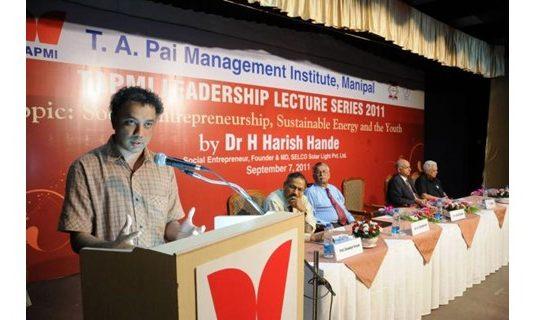
Harish Hande, Founder of Solar Electric Light Company (SELCO) emphasized the need for a decentralized approach to sustainable energy distribution to management and engineering students from Manipal University. During a lecture on “Social entrepreneurship, sustainable energy and the youth,” Hande explained that business models need to shift towards focusing on the needs of the poor and should not follow the examples of companies like Walmart and McDonalds.
H. Harish Hande, Magsaysay Award-winner and Managing Director of SELCO India Pvt. Ltd., said on Wednesday that the country needed a decentralised approach to sustainable energy.
He was delivering a lecture on “Social entrepreneurship, sustainable energy and the youth” organised here by T.A. Pai Management Institute (TAPMI) as part of its leadership lecture series. Students pursuing management and engineering courses in Manipal University attended the lecture.
Dr. Hande said that “solar” loans to poor people had facilitated the process of financial inclusion in rural areas. Micro financing of solar products in rural areas did not help as it did not facilitate asset creation. Instead, the regional rural banks, including Netravati Grameena Bank and Malaprabha Grameena Bank, played a vital role in financing solar products, which had helped people living in rural areas.
He said that India was a paradox of an overdeveloped and an underdeveloped country. India needed a paradigm shift in the business models it followed.
Despite all the talk of nine per cent economic growth, there were glaring inequalities in the country, he said.
There was a difference between needs and wants. Business models should be created focusing on the needs of the poor. India should be become a centre of innovation of business models which other developing countries in Africa could follow. There was no point in following the business models of Mc Donalds and Walmart. Business models should take into account the geographic location and ground realities, which differed from State to State in the country, he said.
Dr. Hande said that being educated in an IIT, he was a product of subsidy.
He opposed the view of subsidies being perceived as bad in several MBA institutes. The youth should choose a job not just on monetary consideration, but also with the intention of contributing to society, he said.
Judging people on the basis of their job profile and social status was wrong. All individuals had an identity of their own, which should be respected.
The Indian education system was too theoretical than practical. It took him four years to unlearn what he had learnt as a student of IIT. The youth in the country were hesitant to work in rural areas. They preferred to work in urban areas, Dr. Hande said.
Pro-Chancellor of Manipal University H.S. Ballal, Director of the institute A.S. Vasudeva Rao, Dean (Planning and Development) Chowdari Prasad, R.C. Natarajan, professor, and member of the institute’s governing council H. Shantharam were among those present.
http://www.thehindu.com/news/cities/Mangalore/article2435153.ece
